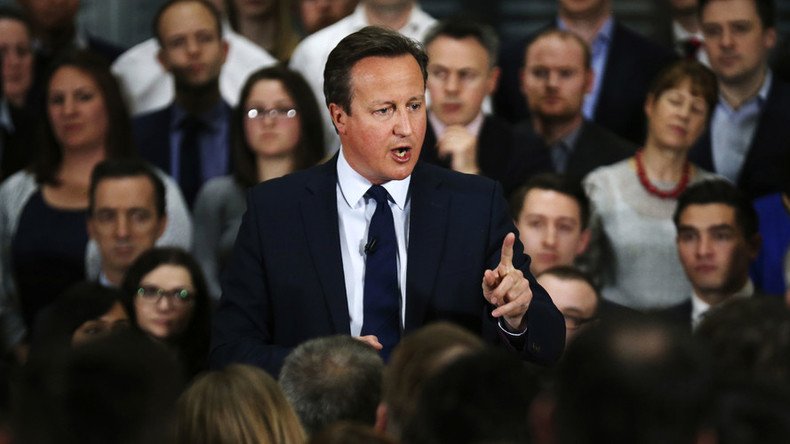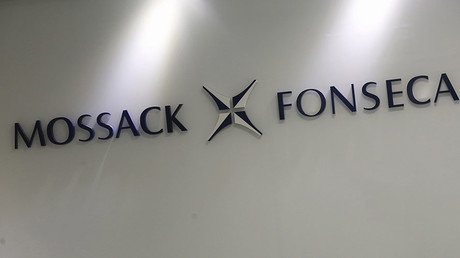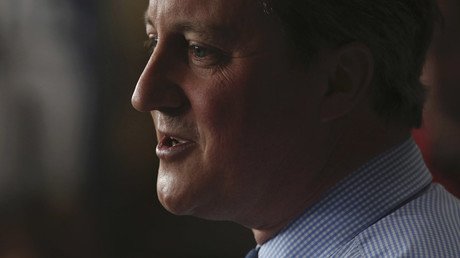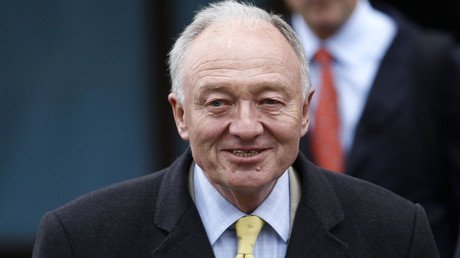Britain is the heart and soul of tax evasion

The British government’s claim to be tackling tax evasion is about as credible as Al Capone claiming to be leading the fight against organized crime. In fact, Britain is at the heart of the global tax haven network, and continues to lead the fight against its regulation.
The 11 and a half million leaked documents from Panamanian law firm Mossack Fonseca have proven, once again, what we have already known for some time – that the ‘offshore world’ of tax havens is a den of money laundering and tax evasion right at the heart of the global financial system.
Despite attempts by Western media to twist the revelations into a story about the ‘corruption’ of official enemies – North Korea, Syria, China and, of course, Putin, who is not even mentioned in the documents – the real story is the British government’s assiduous cultivation of the offshore world. For whilst corruption exists in every country, what enables that corruption to flourish and become institutionalized is the network of secretive financial regimes that allow the world’s biggest criminals and fraudsters to escape taxation, regulation and oversight of their activities. And this network is a conscious creation of the British state.
Of the 215,000 companies identified in the Mossack Fonseca documents, over half were incorporated in the British Virgin Islands, one single territory in what tax haven expert Nicholas Shaxson calls a “spider’s web” of well over a dozen separate UK-controlled dens of financial chicanery.
In addition, the UK was ranked number two of those jurisdictions where the banks, law firms and other middlemen associated with the Panama Papers operate, only topped by Hong Kong, whose institutional environment is itself a creation of the UK. And of the ten banks who most frequently asked Mossack Fonseca to set up paper companies to hide their client’s finances, four were British: HSBC, Coutts, Rothschild and UBS.
HSBC, recently fined $1.9bn for laundering the money of Mexico’s most violent drug cartels, used the Panamanian firm to create 2,300 offshore companies, whilst Coutts – the family bank of the Windsors – set up just under 500.
And, of course, David Cameron’s own father was named in the papers, having “helped create and develop” Blairmore Holdings, worth $20million, from its inception in 1982 till his death in 2010. Blairmore, in which Cameron junior was also a shareholder, was registered in the Bahamas, and was specifically advertised to investors as a means of avoiding UK tax.
The Daily Mail noted that: “Even though he lived in London, the Prime Minister's father would leave the country and fly to Switzerland or the Bahamas for board meetings of Blairmore Holdings – to ensure it would not have to pay UK income tax or corporation tax. He hired a small army of Bahamas residents, including a part-time bishop, to sign its paperwork – as part of another bid to show his firm was not British-based.”
That Britain should emerge as central to this scandal is no surprise. For as Nicholas Shaxson, a leading authority on tax havens put it when I interviewed him in 2011, “The City of London is effectively the grand-daddy of the global offshore system.” Whilst there are various different lists of tax havens in existence, depending on how exactly they are defined, on any one of them explains Shaxson, “you will see that about half of the tax havens on there, of the ones that matter, are in some way British or partly British.” Firstly, are “Jersey, Guernsey and the Isle of Man: the crown dependencies. They’re very fundamentally controlled by Britain.” Then there are the Overseas Territories, such as the Caymans, Bermuda, and the Virgin Islands, in which “all the things that matter are effectively controlled by Great Britain.”
Of course, it suits the British government to portray all these territories as ‘autonomous’ or ‘self-governing’ in order to provide itself with plausible deniability about what they are doing. But the reality is they are run by a governor appointed by the Queen on the British government’s advice.
Casey Gill, one of the earliest lawyers specializing in offshore operations explained how legislation was devised in the Caymans: tax experts and accountants would fly in from all over the world “and say ‘these are the loopholes in our system’. And Caymans legislation would be designed accordingly,” often by a conglomerate run by Gill, before being sent to the British Foreign Office for approval. Shaxson asked Gill if Britain, who had the power to veto such legislation, ever raised any objections. “No,” he said, “Not ever. Never.”
The entire UK-controlled web is home to offshore deposits estimated in 2009 to be worth $3.2 trillion, 55 percent of the global total: equivalent to roughly $500 for every man, woman and child on the planet.
This web emerged In the 1960s. Whilst ostensibly involved in a process of ‘decolonization’, in fact the UK hung on to a large global network of small, sparsely-populated islands: “The British empire”, Shaxson wrote, “had faked its own death.” These islands were to serve the same imperial purpose the empire had always had: the projection of British power and the channeling of African, Asian and Latin American wealth into Britain. But whilst some of the islands, such as Diego Garcia and the Falklands, were to serve as crucial military outposts, many of the others were developed as a means of facilitating the financial plunder of the former colonial world.
In Shaxson’s words, the role of these tax havens is to “capture passing foreign business and channel it to London just as a spider’s web catches insects” whilst also acting as a “money laundering filter that lets the City get involved in dirty business while providing it with enough distance to maintain plausible deniability.”
Whilst the vast majority of critical media reporting on tax havens tends to portray the UK as a ‘victim’ of tax havens, the reality is that, just like the empire they replaced, these ‘treasure islands’ provide a massive cash injection into the ‘motherland’, with the Crown Dependencies alone providing the UK with net financing of $332.5 billion in just one quarter of 2009, for example. And where does this money come from? Obviously, it comes from all over the world; but wealthy European and North American nations have been much better equipped to prevent ‘capital flight’ from their territories than have developing countries. Indeed, the Bank of England took special care, when it was establishing the global tax haven network, to protect the UK from potential ill effects.
In 2008, Global Financial Integrity estimated that flows of illicit money out of developing countries into tax havens were running at about $1.25 trillion per year, roughly ten times the total value of aid given to developing countries by the rich world. Whilst those such as Cameron are more interested in handwringing about ‘corrupt African governments’ than in examining the system that enabled and promoted this corruption, tax havens are facilitating the plunder, by the London banks, of African wealth. And they are doing so because this is what they were designed to do – to continue the extortion of colonialism, just at the moment Britain was forced to give up the bulk of its formal empire.
It is this system that Cameron’s government - in diametric opposition to its rhetorical flourishes - is working to perpetuate. Indeed, much of Cameron’s battling with Europe has been driven precisely by the desire to maintain the impunity of the City and its web of tax havens in the face of attempts by the EU to regulate the banking sector.
As the FT reported this week, “David Cameron personally intervened in 2013 to weaken an EU drive to reveal the beneficiaries of trusts, creating a possible loophole that other European nations warned could be exploited by tax evaders.” Britain has also led opposition to EU attempts at reforms that would make corporations register for tax in the places where they actually do business. And one of the key concessions Cameron managed to wring out of the EU Summit in February this year was that Britain, in the words of the Telegraph, “can now pull an emergency lever over eurozone laws they have ‘reasoned opposition’ to, forcing leaders to hold back from implementation until their concerns are addressed.” The Telegraph specifically cites EU attempts to impose bonuses taxes, to introduce a Financial Transactions Tax, and to “clamp down on the reckless ‘Anglo-Saxon’ lenders which many on the continent still blame for bringing crisis to European shores back in 2009” as examples of those regulations Britain is now likely to veto. In other words, far from being hamstrung from taking action by the non-cooperation of other countries, the UK is the leading saboteur of any attempts to make the financial sector more accountable.
But of course, this is only natural. For accountability would bring the whole criminal enterprise crashing down.
The statements, views and opinions expressed in this column are solely those of the author and do not necessarily represent those of RT.

















